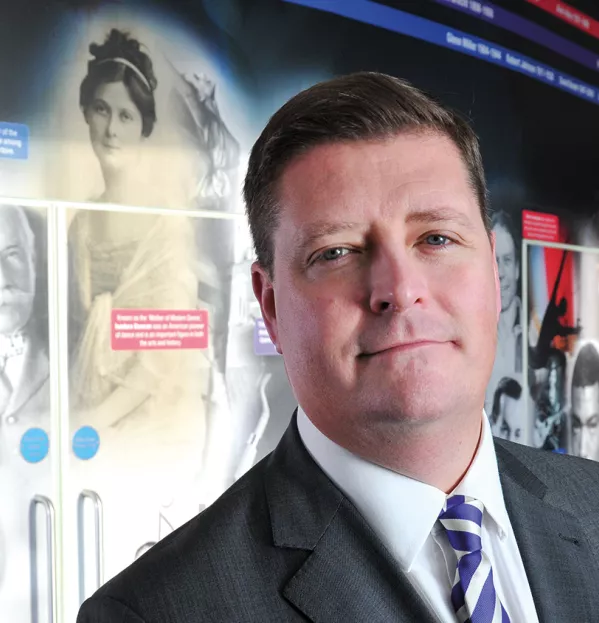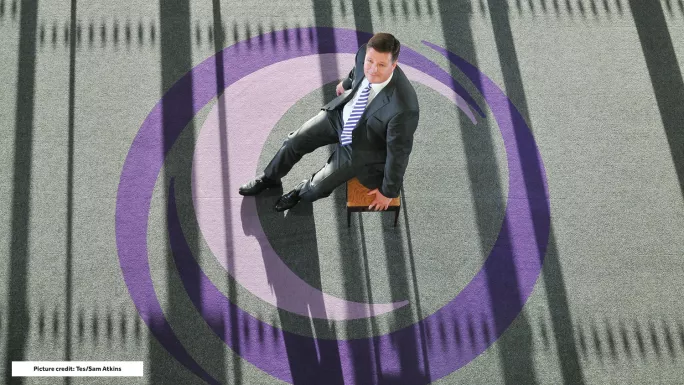
‘My reputation’s on the line - if this doesn’t come off, I’ll lose my job’

Martyn Oliver can confound preconceptions. The burly chief executive of Outwood Grange rattles off statistics about his multi-academy trust’s finances and performance at bewildering speed.
If you were asked to guess the subject that he once taught, you would probably think maths.
Then again, his use of phrases like “seven-strand transformation model” might suggest business studies.
In fact, Oliver was an art teacher - a “fairly unusual” background for a MAT CEO, he admits. He even worked as a classically trained portraitist before becoming a teacher - a revelation that visibly surprises his colleagues, including some he’s worked with for years.
“I made enough money to live off [the portraits] - not enough to carry on living off them,” he smiles.
The profile of both Oliver and Outwood is set to grow in the year ahead. Raising school standards in the North is high on the political agenda, and with Outwood one of the best performing MATs in the country, the trust will be expected to do much of the heavy lifting.
In the shorter term, Oliver is set to take over eight schools from the collapsed Wakefield City Academies Trust (WCAT). It’s no exaggeration to say that how he performs in this task will be viewed by many as a test of the MAT system as a whole.
Perhaps most importantly, his trust has pioneered an approach to school improvement, involving tight central control over academies, which is proving increasingly popular nationwide. There will be many eyes on Oliver over the coming months. So what makes him tick?
Oliver started working as a teacher in 1996. Growing up in Lincolnshire, he was inspired to enter the profession by a “brilliant” English teacher, and expected to teach the subject himself. Instead, he found that he was “pulled” towards art - a seed had probably been planted by his father regularly driving him down to visit London galleries during his childhood.
He got a taste for leadership when he was appointed an assistant head of sixth form at his first school, before moving from Lincolnshire to hold a number of leadership positions in County Durham. But it was a visit to complete some professional development at Outwood Grange Academy in Wakefield, West Yorkshire, that would determine the trajectory of the rest of his career.
At the time, Outwood was not just one of the best schools in the country, but also at the forefront of the school-sponsored academy movement. The concept piqued Oliver’s interest, and he applied to be principal of the first school it was taking on - Outwood Academy Adwick in Doncaster. He didn’t get that job but he must have done something right, because Sir Michael Wilkins, Outwood’s founding CEO, decided to employ him anyway.
Oliver quickly climbed the ladder at the new MAT, first becoming principal of Outwood Grange, and then steering a number of schools from special measures to “outstanding” as an executive principal in the growing trust. When Sir Michael retired in September 2016, Oliver replaced him as CEO.
Secrets of success
Outwood’s performance figures look impressive. According to the government’s MAT league table, it is one of the highest performing trusts in the country on the Progress 8 measure. A child who goes to an Outwood school can expect to perform roughly 0.4 of a grade better in each of their GCSE subjects compared with if they had gone to a national average school. At primary level, meanwhile, Outwood was named the best MAT in the country for writing progress.
Oliver suggests there are three principles behind this success. The first is “building capacity in advance of need”. Outwood’s senior leaders are on central deployment contracts, which means they can be quickly moved to where they’re most needed in the trust. The MAT has also developed a cadre of subject leaders - able to earn more than a vice-principal while remaining in the classroom - who can hit the ground running in any school it takes on.
The second rule is that expansion has “got to make geographical sense”. Outwood operates in a cluster in the North East, Yorkshire and the East Midlands. “I like to be able to drive to all of the schools,” Oliver says. “I would hate to be a visitor in my own school.”
But it is the third principle for which Outwood is best known - and this is the one that provokes the most controversy. “You need a model for school improvement which is systematic and consistent,” Oliver says firmly.
Outwood runs all of its schools based on a single blueprint - covering everything from what is taught to the paint on the walls. The same improvement steps are adopted with every school it takes on (the “seven-strand transformation model”). The school day is structured identically. Teachers deliver the same schemes of work.
You don’t fully grasp the sheer reach of this philosophy until you walk around an Outwood school. At Outwood Academy Adwick, a learning display on one of the walls highlights the “Dirty Thirty” - the words that students are most likely to spell incorrectly. Every school in Outwood’s chain focuses on these same 30 words.

Consistency is even applied to the colour of the corridor walls, with the same paint used in every school - “willow green”, specifically. Oliver says this is not a sign of “megalomania”. When a decision is made about which paint to use, “I don’t want to make that decision ever again,” he explains simply.
This lack of autonomy for individual schools attracts criticism from some quarters, but Oliver insists that the approach is not about “prescription or restriction” but “efficacy”. “If you’re doing something really well in one school, it’s perverse to withhold it,” he says.
He invokes the analogy of a medical operation. A patient is about to be anaesthetised, when “the surgeon leans down and says: ‘I’ve had an idea about trying it differently’”. “You would never see that take place,” Oliver says indignantly. “If you know something is working well in one organisation, why would you experiment? Do you want me to go and experiment on children? The vanity of adults who say that staggers me,” he says, shaking his head.
While Outwood continues to perform well, Oliver acknowledges that the reputation of the MAT system as a whole has taken a knock. His trust is helping to pick up the pieces after the implosion of WCAT. Elsewhere in the North, Bright Tribe Trust has become embroiled in controversy.
‘Reputation on the line’
However, Oliver argues that MATs have received a disproportionately negative press. He opens a map of Outwood’s footprint on his laptop, pointing out schools that were previously failing under local authority control. “Special measures, special measures, special measures,” he says, repeating the phrase as his finger jabs at 16 different schools. He also thinks that attacking some MAT bosses for the poor performance of their schools, while berating others for a lack of local autonomy, is contradictory. “I don’t mind being accountable, as long as I’m responsible,” he says.
Oliver admits that Outwood’s decision to take on the WCAT schools has “put my reputation back on the line”, but he reveals that he will not be paid more for running the additional schools. “So why do I do it?” He lets the question hang in the air, before tapping a plastic wall display bearing Outwood’s motto, “Students First”. “There are children in those schools that need help.”
Executive pay has undoubtedly been a lightning rod for discontent about the MAT system. Oliver earns £168,675, but says he has voluntarily forgone any cost-of-living rise since 2013 because he “didn’t feel comfortable” receiving it while teacher pay increases were capped at 1 per cent. But he says he would never tell a peer “what I think they’re worth”.
As well as the rebrokering of the WCAT schools, Oliver’s current preoccupation is improving exam results in the North, which have historically, in general terms, lagged behind those in the South.
The region was once the “powerhouse of this country”, he says, and “it has to be again …it is education that will drive the North”. He is adamant that “the talent is within” the region to complete the task, and the answer doesn’t lie with luring “the great MATs from the South”. He thinks the next stage for the academy system is “MATs formally collaborating”, and to that end Outwood is a founding member of the Northern Alliance of Trusts.
Oliver has his work cut out for him, and he is fully alive to the personal consequences if he fails to deliver - particularly in relation to turning around the WCAT schools. “If it doesn’t come off, I will lose my job,” he says frankly. “The board will have no hesitation in saying to me that I’ve made the wrong decision. And quite rightly so.”
You need a Tes subscription to read this article
Subscribe now to read this article and get other subscriber-only content:
- Unlimited access to all Tes magazine content
- Exclusive subscriber-only stories
- Award-winning email newsletters
- Unlimited access to all Tes magazine content
- Exclusive subscriber-only stories
- Award-winning email newsletters
You need a subscription to read this article
Subscribe now to read this article and get other subscriber-only content, including:
- Unlimited access to all Tes magazine content
- Exclusive subscriber-only stories
- Award-winning email newsletters
- Unlimited access to all Tes magazine content
- Exclusive subscriber-only stories
- Award-winning email newsletters